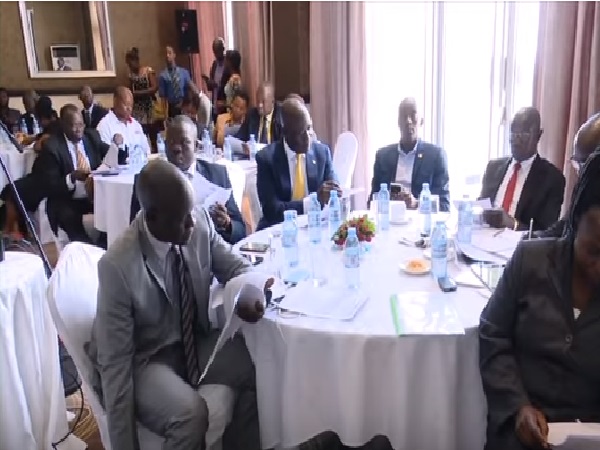At this meeting, local leaders from the districts holding refugees raised a number of issues affecting their communities in light to the large refugee influx to Uganda in the last one year. The refugees mainly comprised of women and children. "Women are normally isolated. when war comes, their counterparts the male tend to run away, they are included in the army or they run away from responsibilities because they don't earn." Said, Rita Nansereko – ED, African Women and Youth Action for Development.
State Minister of Local Government Jennifer Namuyangu proposed an amendment in the Refugee Policy to allow Local Governments to directly engage in refugee issues instead of the Office of the Prime Minister and NGOs. “If it means amending the Refugee Act so that my Local Governments can be key players in this, we have to do it.” Said, Jennifer Namuyangu – State Minister for Local Government. “The moment these Local Governments say we are no longer in charge of the situation, the country will not be in charge of the situation.” Said, Bernard Atiku – MP, Ayivu County. “Let us not work outside the structures of Local Governments, let us build them, let us empower them, and let us use them as engines for development and humanitarian assistance because this is why they were put in place.” Said, Rose Gamwera – Secretary-General, Uganda Local Government Association.
The district leaders from refugee host communities said one of the key challenges their districts face is insecurity since some of the refugees may sneak in with guns. Gulu district Chairman Martin Ojara Mapenduzi says some South Sudan refugees have firearms posing a security threat to his community. “Gulu alone has about seven Generals from South Sudan who have acquired land and bout houses. But there are so many army officers scattered living in the areas of Badege, Layibik different places.” Said, Martin Ojara Mapenduzi – LC 5 Chairman, Gulu District.
There is also fear of the spread of communicable diseases. “…call is working on an investigation or a research or a study in some of these refugee camps. But preliminary findings indicate that 60% of the refugees have HIV & AIDS.” Said, Gerald Menya – Commissioner for Refugees. State Minister for Refugees and Disaster Preparedness Musa Ecweru called for calm amongst the host communities and emphasized that the government cannot block refugees fleeing their countries for one reason or another. “We will not, what we can only do is, first of all, encourage the people particularly our Heads of State and governments around the region to work for durable in the region.” Said, Musa Ecweru – State Minister, Refugees and Disaster Preparedness. Local Government leaders have a concern that if the donors pull out then that means the responsibility of these refugees will entirely be on their side.

